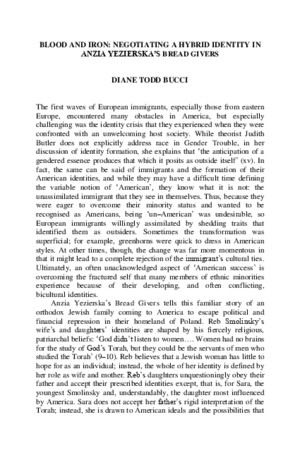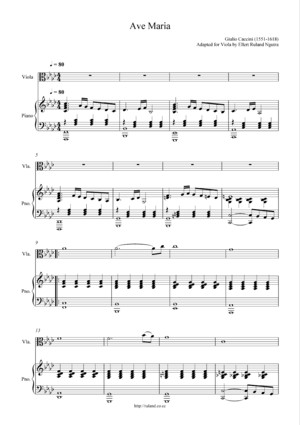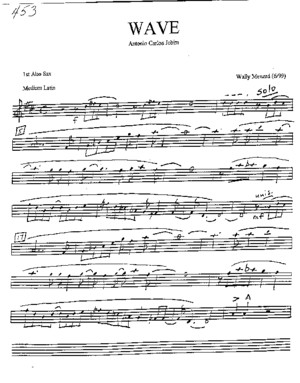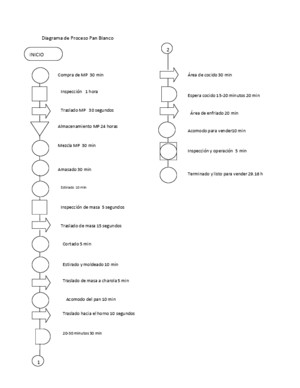4 Diane Bucci - Blood and Iron
There is document - 4 Diane Bucci - Blood and Iron available here for reading and downloading. Use the download button below or simple online reader.
The file extension - PDF and ranks to the School Work category.
Tags
Related
Comments
Log in to leave a message!
Description
Download 4 Diane Bucci - Blood and Iron
Transcripts
BLOOD AND IRON: NEGOTIATING A HYBRID IDENTITY IN ANZIA YEZIERSKA’S BREAD GIVERS DIANE TODD BUCCI The first waves of European immigrants, especially those from eastern Europe, encountered many obstacles in America, but especially challenging was the identity crisis that they experienced when they were confronted with an unwelcoming host society While theorist Judith Butler does not explicitly address race in Gender Trouble , in her discussion of identity formation, she explains that ‗ the anticipation of a gendered essence produces that which it posits as outside itself ‘ (xv) In fact, the same can be said of immigrants and the formation of their American identities, and while they may have a difficult time defining the variable notion of ‗ American ‘, they know what it is not: the unassimilated immigrant that they see in themselves Thus, because they were eager to overcome their minority status and wanted to be recognised as Americans, being ‗ un – American ‘ was undesirable, so European immigrants willingly assimilated by shedding traits that identified them as outsiders Sometimes the transformation was superficial; for example, greenhorns were quick to dress in American styles At other times, though, the change was far more momentous in that it might lead to a complete rejection of the immigrant‘s cultural ties Ultimately, an often unacknowledged aspect of ‗ American success ‘ is overcoming the fractured self that many members of ethnic minorities experience because of their developing, and often conflicting, biculturalidentities Anzia Yezierska ‘s Bread Givers tells this familiar story of an orthodox Jewish family coming to America to escape political and financial repression in their homeland of Poland Reb Smolinsky‘s wife ‘s and daug hters‘ identities are shaped by his fiercely religious, patriarchal beliefs: ‗ God didn‘t listen to women … Women had no brains for the study of God‘s Torah, but they could be the servants of men who studied the Torah ‘ (9 – 10) Reb believes that a Jewish woman has little to hope for as an individual; instead, the whole of her identity is defined by her role as wife and mother Reb‘s daughters unquestioningly obey their father and accept their prescribed identities except, that is, for Sara, the youngest Smolinsky and, understandably, the daughter most influenced by America Sara does not accept her father‘s rigid interpretation of the Torah; instead, she is drawn to American ideals and the possibilities that PEER ENGLISH 48 exist for women in America Certainly, novels that focus on the formative years of a protagonist show that character‘s evolving self in conflict; indeed, this coming of age novel portrays Sara negotiating the identity crisis that she experiences as she confronts both gender and cultural expectations as she struggles to become an independent woman in the New World The novel portrays a series of events that illustrate Sara‘s development into an Americanised individual, the legacy of which, as noted, required denial of the ethnic self and, indeed, Sara finds satisfaction in her American solitude; however, there are also moments when Sara feels achingly alone I would like to argue that Sara‘s true growth occurs when she recognises that, although she achieves the so – called American Dream, she must accommodate her Jewish roots, and in turn accept the Jewish part of her fragmented identity to experience complete fulfilment It is because of this reconciliation and acceptance that, contrary to much critical opinion, the novel has a hopeful ending Chip Rhodes notes that Yezierska was ‗ [f]amous in her day as a Horatio Alger – esque figure who succeeded through tenacity and talent ‘ (295), and indeed, it is with the ambition of the mythic rags – to – riches Alger character that Sara, Yezierska‘s literary doppelganger, pursues her America – inspired goals In his discussion of the portrayal of the self – made man in American fiction, John G Cawelti explains that among the values embodied by Alger‘s characters is ‗ hard work ‘ (121) Like Alger‘s heroes, Sara begins her journey to independence when she is a child, and her understanding that hard work is required to be an American is evidence of her acceptance of American ideals The need for money was so great for immigrant families that children were expected to work, and young Sara‘s ‗ job ‘ is to search the neighbourhood for unburned pieces of coal and wood to heat the family‘s apartment In her study of lower East Side immigrant women, Elizabeth Ewen notes that this was not uncommon: ‗ Both foreign and native – born working – class families tried to offset the expense of heat by utilizing the ― city forest‖ : wood from abandoned construction sites, industrial debris, and pieces of coal from the railroad tracks, dock areas, or fallen from the delivery truck ‘ (152) Ewen adds, ‗ In fact, a large part of the minimum necessary to support life could be picked up on the streets by boys and girls whose hunting instincts have been sharpened by necessity ‘ (153) But despite the fact that it was not uncommon for a child to scavenge, doing so makes Sara feel ‗ like a beggar and thief ‘ (Yezierska 6) Even at ten, self – respect is a fundamental part of her identity: young Sara is determined to make an honest living and even resists charity When Muhmenkeh, a helpful neighbour, offers to give her herring for nothing, Sara refuses: ‗I‘m no beggar! ‘ (21), she insists Instead, Sara uses her only quarter to PEER ENGLISH 49 purchase the herring which she then peddles to earn money to help the family pay the rent: ‗ I want to go into business like a person ‘ (21) and ‗ [e]arning twenty – five and sometimes thirty to fifty cents a day made me feel independent, like a real person ‘ , claims the young entrepreneur (21, 28) These feelings of independence help to validate Sara‘s emerging Americanised identity, but still Sara is not satisfied with such meagre rewards: ‗ More and more I began to think inside myself, I don‘t want to sell herring for the rest of my days I want to learn something I want to do something I want some day to make myself for a person and come among people [sic] ‘ (66), so she takes another job in a paper – box factory where she is ‗ the quickest ― hand ‖ on the floor ‘ and earns ‗ bigger wages than the big women ‘ (89) These actions exhibit Sara‘s work ethic, yet she is frustrated that, in spite of her determination, she cannot rise above her working – class, immigrant status One day she reads about a young woman like herself, ‗ slaving away in the shop Her hair was already turning gray, and nothing had ever happened to her Then suddenly she began to study in the night school, then college And worked and studied, on and on, till she became a teacher in the schools ‘ (155) This story enables Sara to recognise that to escape the oppression of the ghetto, she must do more than work hard; she must transform her identity by obtaining an education This, too, is a necessity in the Alger success stories: as Cawelti notes, the hero ‗ has to educate himself ‘ (118) Indeed, Sara‘s persistence does not falter as she pursues her goal of becoming educated, and she recognises that it will be a solitary pursuit Sara takes a job working long hours in a laundry and attends night school, and she finds a filthy room in a tenement that costs more than she can afford She must bribe the woman by paying a month‘s rent in advance, but Sara is determined to have solitude in her quest Despite the refusal of many landlords to rent to a single woman, Sara is unrelenting: she must not share a room Ewen notes the significance of an immigrant woman living alone: ‗ Only in rare cases did young women move out to live and manage [on] their own ‘ (108) Sara identifies having a room of her own with a door to ensure privacy as the ‗ bottom starting – point of becoming a person ‘ (159), and she values the ‗ stillness ‘ that she experiences for the first time in her life: ‗ I, alone with myself, was enjoying myself for the first time as with grandest company ‘ (157) Given her strong familial and cultural ties, Sara‘s self – interest is unusual Ewen explains that ‗ [t]he sense of [family] obligation was strong among [immigrant] daughters ‘ (105) In her introduction to the 1975 edition of the novel, Alice Kessler Harris writes, ‗ [W]hen a woman‘s autonomy involved the search for personal fulfillment, it
Recommended















